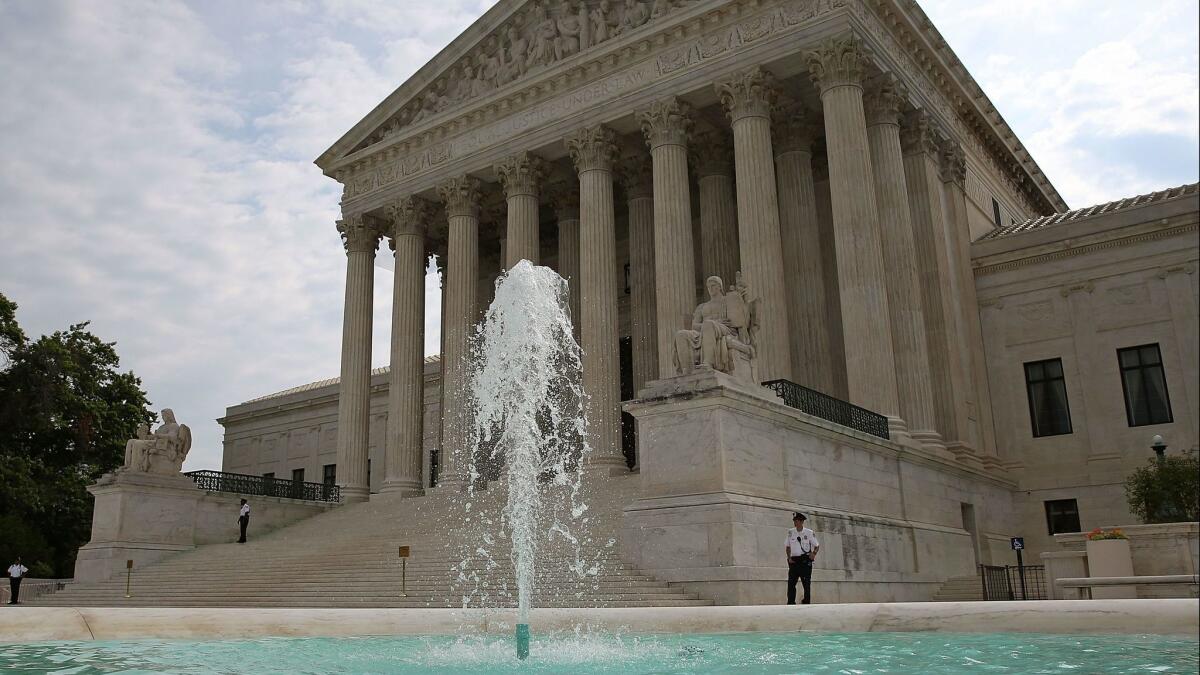Supreme Court sidesteps abortion dispute between Trump lawyers and ACLU over teen immigrant

- Share via
Reporting from Washington — The Supreme Court on Monday steered around a long-pending abortion dispute between the Trump administration and ACLU lawyers over young immigrant women in custody, telling lower courts on Monday to start over in deciding the issue.
In a short, unsigned opinion, the justices wiped away rulings by several judges who last fall had cleared the way for a 17-year-old to see a doctor and obtain an abortion.
In doing so, the Supreme Court cited its “established practice” of wiping away rulings in disputed cases that were resolved before the losing side could appeal. In this case, the losing side was the Trump administration, whose lawyers wanted to appeal to the high court in hopes of blocking the teenager’s abortion.
But they were thwarted in late October when ACLU lawyers moved quickly to take the young woman to a doctor in Texas just hours after a judge in Washington had cleared the way.
Administration lawyers had argued the government had no duty to “facilitate” an abortion by allowing the young women to leave the detention center.
While the abortion for “Jane Doe” appeared to have ended the case, Justice Department officials, including Atty. Gen. Jeff Sessions, said they were upset by what had happened, and they accused the ACLU lawyers of misleading them in the hours before the abortion took place.
U.S. Solicitor Gen. Noel Francisco then filed an unusual appeal with the high court, arguing the lower courts were wrong and calling for sanctions against the ACLU.
For nearly six months, the justices weighed the appeal behind closed doors. In the end, they took no action other than to set aside the rulings by the federal judge in Washington and the U.S. Court of Appeals for the District of Columbia. It was a procedural move rather than one based on the legal claims in the case.
The outcome leaves unresolved the question of whether young immigrants who crossed the border illegally have a right to obtain an abortion with private funds.
ACLU lawyers have brought a separate class-action claim on behalf of other young women, and that dispute is still pending in the federal courts in Washington.
Brigitte Amiri, deputy director of the ACLU’s Reproductive Freedom Project, said the decision “doesn’t affect our ongoing efforts to ensure that all Janes can get an abortion if they need one. The district court [in the class action] has blocked the Trump administration’s cruel policy of obstructing unaccompanied immigrant minors’ access to abortion…. And we won’t stop until we strike it down once and for all.”
Justice Department spokeswoman Kerri Kupec said, “We are pleased with the Supreme Court’s decision to set aside a lower court decision that allowed for an unaccompanied minor to receive an abortion while in federal custody.” She said past rulings “made clear that the federal government is not required to facilitate abortions for minors and may choose policies favoring life over abortion.”
It is not clear why it took the court nearly six months to act on the appeal in Azar vs. Garza.
The justices also took no action on the administration’s request for sanctions against ACLU lawyers.
Administration lawyers had alleged the ACLU attorneys misled them by taking the young woman to see a doctor early in the morning before they could seek a stay from the Supreme Court. The ACLU disagreed and said its lawyers had not deceived anyone and had reacted reasonably after a judge cleared the way for their client to have the abortion.
The justices recited both sides of the issue and did not say which side had the better claim.
“On the one hand, all attorneys must remain aware of the principle that zealous advocacy does not displace their obligations as officers of the court. Especially in fast-paced, emergency proceedings like those at issue here, it is critical that lawyers and courts alike be able to rely on one another’s representations,” the justices wrote. “On the other hand, lawyers also have ethical obligations to their clients and not all communications breakdowns constitute misconduct.”
Major questions before the Supreme Court this year »
On Twitter: DavidGSavage
UPDATES:
12:50 p.m.: This story was updated with reaction from Sessions, the ACLU and other background.
This story was originally published at 7:05 a.m.
More to Read
Get the L.A. Times Politics newsletter
Deeply reported insights into legislation, politics and policy from Sacramento, Washington and beyond. In your inbox twice per week.
You may occasionally receive promotional content from the Los Angeles Times.











